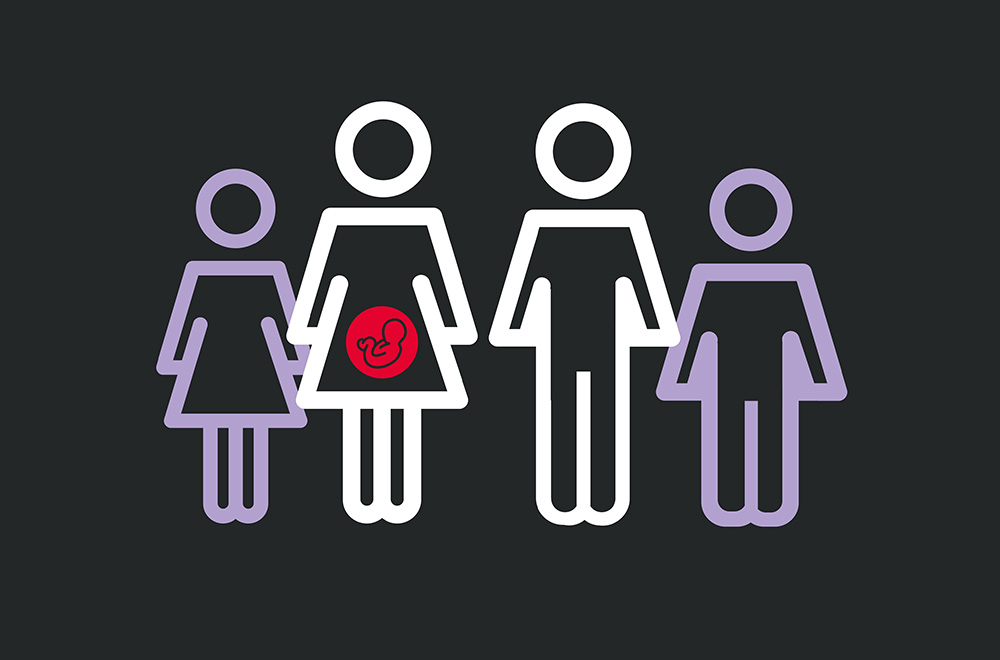Sodium valproate can cause serious problems in a developing baby. The Medicines and Healthcare Products Regulatory Agency (MHRA) has issued regulations on the way it is prescribed to both men and women.
What are the risks?
Sodium valproate is an effective anti-seizure medication (ASM), and for some people with epilepsy it is the only medication that controls their seizures. Various different forms of sodium valproate are available, including Epilim, Depakote, Convulex, Episenta, Epival, Kentlim, Orlept, Sodium Valproate, Syonell, Valpal, Belvo and Dyzantil. It may also be called ‘valproate’ or ‘valproic acid’.
Research shows that sodium valproate can cause serious problems in a developing baby. Therefore, the Medicines and Healthcare Products Regulatory Agency (MHRA) has advised that it must not be prescribed to girls, or women and men under the age of 55 unless it is the only ASM that works for them.
Women and girls
If a baby is exposed to sodium valproate during pregnancy, there is a risk of it being born with physical disabilities, sometimes called birth defects, and developmental issues. This applies whether valproate is taken alone or in combination with other medicines.
Of babies whose mothers take sodium valproate during pregnancy, up to 1 in 10 (10%) are at risk of having a birth defect and up to 4 in 10 children (40%) have problems with development and learning as they grow up.
These risks may apply to other ASMs but are higher for sodium valproate than for other ASMs. Birth defects can include:
- ‘minor malformations’ (such as small fingers and toes); and
- ‘major malformations’ (such as spina bifida or a cleft palate, which may need surgery).
When sodium valproate is taken during pregnancy, it may also affect a child’s development and learning after they are born and as they grow up. Development and learning problems are sometimes knowns as ‘fetal anti-convulsant syndrome’.
Problems can include:
- delayed walking and talking;
- poor speech and language skills;
- memory problems; and
- lower intelligence than other children of the same age.
Children exposed to sodium valproate in the womb are also more likely to have an autism spectrum disorder.
MHRA guidance
The MHRA currently recommend that sodium valproate must no longer be prescribed to girls, and women under the age of 55, unless it is the only drug that works for them and unless they are on a pregnancy prevention programme (sometimes called PREVENT). This is because of the risk of birth defects and developmental disorders for an unborn baby. Where possible anyone already taking sodium valproate should be switched to another treatment. Sodium valproate can be prescribed by a specialist for women aged 55 and over.
The MHRA have also issued guidance about the prescription of Topiramate for women and girls. Visit our pages on pregnancy and pregnancy risks for further information about the risks of sodium valproate, topiramate, and other ASMs in pregnancy.
If you have concerns, talk to your specialist as soon as possible about the best options for you. Do not stop taking sodium valproate or any other ASMs unless your specialist has advised you to.
Pregnancy prevention programme (PPP)
If, as a woman or girl, you are prescribed sodium valproate:
- Your specialist will discuss the risks of taking sodium valproate with you, and whether or not you are planning to become pregnant. This will help to decide if the PPP is right for you.
- They will explain the risks to an unborn child if the mother takes sodium valproate during pregnancy. (See above for risks of taking sodium valproate during pregnancy).
- Before you start to take sodium valproate, you will need to have pregnancy tests.
- Your specialist will explain the options for highly effective contraception.
- Your specialist will carry out reviews of your treatment at least annually.
- At your first review you and your specialist will complete an Annual Risk Acknowledgement Form (ARAF). This confirms that you have been given, and understood, appropriate advice. At future reviews only one specialist will need to sign.
- When you get your medication from the pharmacy, the pharmacist should show you the warning on the medication packaging. They should also make sure you have the patient card and leaflet about sodium valproate and check that you have discussed the risks with your doctor.
Visit Gov.uk for more information on valproate use by women and girls
If you are already taking sodium valproate
Talk to your specialist as soon as possible about the best options for you. Do not stop taking sodium valproate or any other ASMs unless your specialist has advised you to.
If you suddenly stop taking your ASM it could cause your seizures to increase, or to become more severe. Seizures could cause more harm for you and your unborn baby than any risks from the drugs themselves.
Pre-conception counselling
If you are planning a family it is important to speak to your specialist as soon as possible to discuss the best form of treatment to keep both you and your baby safe. This is sometimes called preconception counselling, and is essential when taking any ASM but especially so for sodium valproate. It is important that you do not stop taking your medication, or your contraception.
If you are not planning a family
It is still important to have highly effective contraception in place to ensure that you do not become pregnant. Your specialist will explain the options for highly effective contraception.
You must have an annual review with your specialist. Depending on the type of contraception you use you may also need to take a regular pregnancy test and sign a risk acknowledgement form.
If you are already pregnant
Do not stop taking your medication but make an appointment to see your doctor immediately to discuss the best form of treatment.
In some circumstances you may not be able to switch to another medication and your doctor will provide you with more information. You will be closely monitored to ensure you have the best seizure control and to check how your baby is developing.
Risk of lower birth weight
The MHRA have also updated their information on the risk of low birth weight in children exposed to valproate during pregnancy compared to those exposed to lamotrigine or not exposed to anti-seizure medications.
Men and boys
There are concerns that sodium valproate may affect male fertility. While these concerns have been recognised since 2011, recent research suggests that sodium valproate may affect the amount of sperm a man produces and the movement of the sperm.
This research is based on animal studies which show that sodium valproate can have a harmful effect on the testes of young animals. There may also be an effect across generations. A simple test can check quality and quantity of sperm.
In 2024 the MHRA advised that no-one under the age of 55 – both men and women should be started on valproate unless two specialists independently agree and document that there is no other safe and effective medication and a Risk Acknowledgement Form was completed.
New guidance issued in February 2025 has confirmed that men who are started on sodium valproate will need two independent specialists to confirm that it is the only drug that works for them, but they will only need to complete the Risk Acknowledgement Form once. Men who already take sodium valproate will only need sign off from one specialist to continue taking sodium valproate and they will not need to complete the form.
MHRA guidance
The MHRA have looked at data from research again and this suggests that there may be a small increased risk of neurodevelopmental disorders in children fathered by men taking valproate three months prior to, or at the time of, conception compared with men on other anti-seizure medicines.
The guidance for males, which has been introduced as a precaution recommends that:
- You do not stop taking your epilepsy medication without advice from your doctor or specialist.
- You and your female sexual partner use effective contraception while taking valproate and for at least three months after stopping treatment.
- You do not donate sperm during treatment with valproate and for three months after stopping taking valproate.
- You talk to your doctor or specialist about the risks and options at your next regular review.
- If you are considering planning a family in the next year, discuss with your specialist, the possibility of switching to another epilepsy medication.
- You report any harmful reactions linked to taking valproate through the Yellow Card scheme.
- If you are aged under 55 years, you should not be started on valproate unless your specialist has discussed the risks with you and another specialist has agreed that your condition will not respond to other treatments. Or that the risks do not apply to you.
- If you are prescribed sodium valproate and are aged 55 or over your specialist should inform you about the risks and the need for you and your female partner to use effective contraception during your treatment.
We have given an explanation of the new guidance on our news page. You can report suspected side effects you may have to medicines at the Yellow Card reporting site.
Concerned about your child?
Physical or neurodevelopmental problems caused by exposure to sodium valproate in the uterus are known as fetal anti-convulsant syndrome (FACS). If you are concerned that your child or children may have FACS contact your GP or doctor to discuss the issues. You and your GP will be able to look at the medications you were prescribed and the dose you were taking. This will help you to understand whether this could have affected your children. There is no simple test that can confirm a diagnosis of FACS and symptoms can vary significantly from baby to baby. Instead a diagnosis may be reached by eliminating other possible causes. This could include genetic testing.
Your GP will be able to signpost you to your local learning disability team who will be able to identify the right support for your child. If your child is now an adult, your GP will be able to signpost you to the right support. Visit our page on pregnancy risks for further information.
In addition, if you live in the north of England, your doctor may be able to refer you to the Fetal Exposure to Medicines Service (FEMS) run by Manchester University NHS Foundation Trust. This is a pilot service that provides expert assessment, advice, and care plans for people who have problems that could be from exposure to an antiseizure medicine in the womb.
If you feel guilty about FACS
Sodium valproate was first licensed for use in the UK in 1974. Its success in controlling seizures led it to be widely prescribed at a time when there were very few treatment options for people with epilepsy.
It was another 20 years before more drugs became available, offering greater choice of medications with fewer side effects.
In the 21st century people with epilepsy have been encouraged to be partners in their healthcare and to decide on the best course of treatment with their doctor. However, this has not always been the case, and you may not have been offered a choice in the past.
The following organisations provide information and support to families affected by Fetal anti-convulsant syndrome:
INFACTUK
OACS
FACSaware
If you would like to talk things through, please contact our confidential Helpline by email helpline@epilepsysociety.org.uk, phone 0300 102 0024 or chat via our website.
Epilepsy Society is grateful to Dr F J Rugg-Gunn, Consultant Neurologist & Honorary Associate Professor, Clinical Lead, Chalfont Centre for Epilepsy, who reviewed this information.
Information produced: February 2025. Review date February 2027.
Download our Sodium Valproate information
For a printed copy contact our Helpline

Information from the Medicines and Healthcare Products Regulatory Agency
Read information produced by the MHRA around sodium valproate.

Epilepsy Society's confidential helpline is available for anyone affected by epilepsy.
Call us on 01494 601400. You can also reach us by email helpline@epilepsysociety.org.uk or chat with us online.

